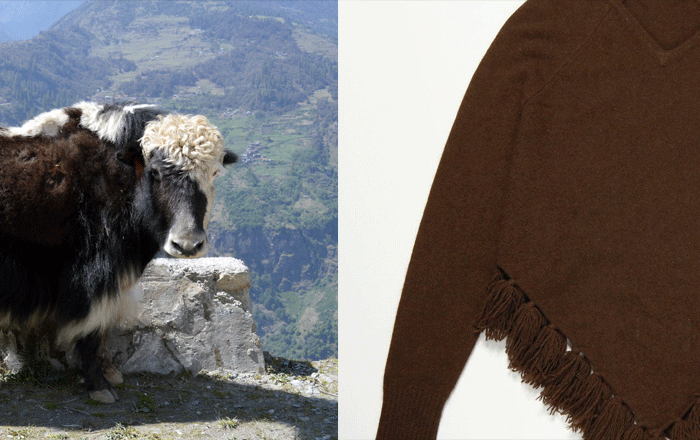Arunachal Pradesh: This winter you must try clothes made from Arunachal’s yak wool!

Almost everything from the yak is used to sustain the life of the herdsmen and their families and is used either directly or sold to provide an income. The herdsmen and their families obtain nearly all their needs from the yak. The products from yak during their lifetime are milk, hair and down, draught power, and dung for fuel, and after slaughter there is the meat and various products from the organs and non-consumable parts of the body and the hide. The majority of these products are used by the herdsmen and their families, but some of them are sold. Income can be derived from most of the products and also from the sale of pack animals and animals for breeding.

Young group of farmers in Arunachal Pradesh are being trained to make winter garments using yak wool and jute, this approach can however result into economic growth in the state and also provide an entrepreneurship boulevard to the local youths.
The training being conducted by the National Research Centre on Yak(NRCY), which is based in Arunachal's Dirang,and the Calcutta based ICAR-N ational Institute of Research on Jute and Allied Fibre Technology (ICAR-NIRJAFT) began in Calcutta yesterday.
The NRYC conducts scientific research and training programmes in yaks reared in high altitude areas of the Himalayan region, mainly Arunachal Pradesh, Sikkim, Himachal Pradesh and Jammu and Kashmir.
There are more thean 13,700 yaks in six blocks of Tawang aand two blocks of West Kameng districts. The project is part of the institute's plan to train yak rearers to take up economically-sustainable yak husbandry.
Yak wool is amorphous that means water does not go through it. Yaks have been able to develop what we believe is the best layer fabric for outdoor pursuits . A yak wool item is said to provide the same warmth in terms of the merino wool garments and be 17 percent lighter. It can keep you warm in temperatures of minus 40 degrees Celsius while merino wool can tackle conditions of upto minus 10 degrees.
The products by yak wool and jute will be manufactured keeping in mind the different climatical demands. The yak wool also reduces the chances of retaining body odour because it quickly absorbs sweat and releases it into the air. Laboratory tasts have shown that the fabric has 66percent great air permeability than merino wool.
Sources: The Telegraph
Image: Internet sources

















